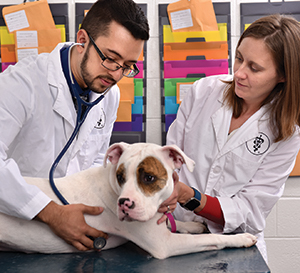
Programs Provide Early Clinical Skills Training
By Tracy Ann Raef
This fall semester first- and second-year students are learning clinical skills and practicing them in the Clinical Skills Laboratory that opened last spring. First-year students in the clinical foundations course are learning syringe and needle safety and handling, and canine cephalic venipuncture and practicing these skills in the clinical skills lab. First-year students are also being taught hand and instrument ties during the Veterinarian in Society course, and with the aid of a variety of models, are able to increase their skill level.
Second-year students progress to surgical instrument handling, simple sutures, pedicle ligations, and knot security.
Also this fall semester, students are learning surgical techniques in a revamped third-year surgical laboratory. Partnering with area shelters, students will get more hands-on surgical experience by performing spays and neuters in the remodeled surgical teaching laboratory (junior surgery).
“The new structure of the lab will give students more surgical and case management experience,” said Dr. Joyce Carnevale, coordinator of the surgical teaching laboratory. “An important benefit to the program is each student team will be responsible for patient care of the shelter animals including vaccination and preventive care, as well as the management of common disease conditions that these animals may have.”
Because shelter populations can be quite diverse, students will also gain experience with a variety of life stages from pediatrics to geriatrics. Carnevale adds that students will also receive more exposure to laboratory work such as preparing slides and drawing blood. Weekly lectures include topics such as low-stress handling and patient care management.
“Restructuring the methods of training surgical skills to students was done after in-depth evaluations of how we teach and what is best for our students in the long term,” said Dr. Tom Johnson, LVMC director of operations. “Our students will be better veterinarians and better surgeons when they have completed this new training.”

